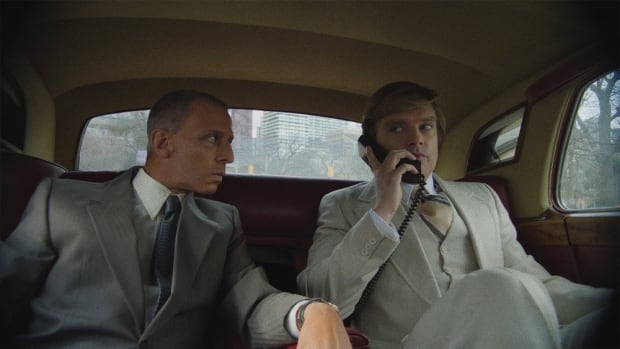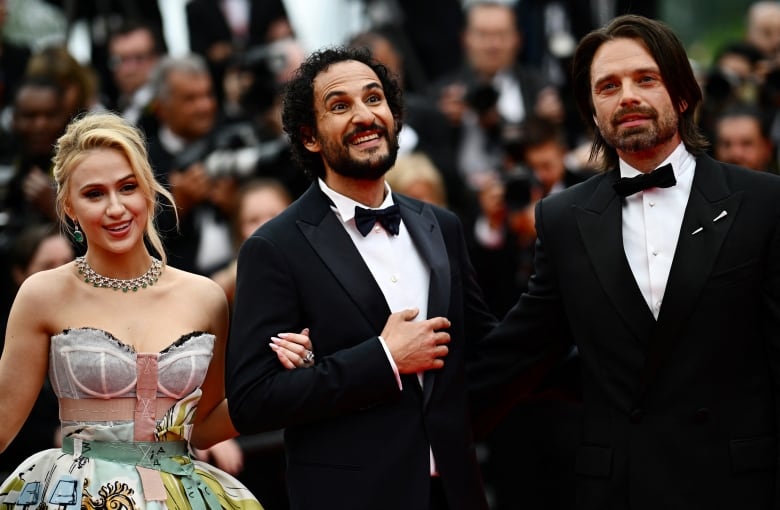
The Donald Trump biopic The Apprentice arrived with about as much subtlety as its scheduling at the Toronto International Film Festival.
Just as the Ali Abassi-directed film was plopped into the festival’s opening night schedule on Thursday as a last-minute surprise, the film barrels into its thesis without much warning or preamble.
Documenting the former U.S. president’s beginnings as an upstart New York real estate mogul, this interpretation of Trump fits neatly into the filmic genre of men corrupted by power and greed — one that, pointedly, more often operates around the rise and fall of Wall Street businessmen or criminals.
To be fair, this is a fictional Trump — a characterization that the man it is based on has already unequivocally denounced. But even outside whether The Apprentice is fair to its subject, the bigger issue is how it stumbles past attempts to define him.
After an intro featuring archival footage of Watergate-era Richard Nixon and seedy visions of 1970s New York, The Apprentice doesn’t seek to give us context of the character as Trump presides over plans for his eventual hotel empire. It doesn’t begin with a Goodfellas-reminiscent monologue like that of Ray Liotta’s Henry Hill, who “always wanted to be a gangster” and sets up what is, in that film’s opinion, the moral descent of the character at its core.
Instead, The Apprentice begins with a young Trump (played with, as the movie progresses, increasingly vocal accuracy by Sebastian Stan) sitting awkwardly in a club with a beautiful young date. And rather than enjoying the company, this Trump is merely pointing out to her all the famous men he’s now able to sit next to.
Not just for the stutteringly sudden way we jump into it, this opening is an awkward jumping-off point that sets the tone for the half-character study, half-cultural criticism to follow. Because that insecurity plays into the full version of Trump that Abbasi and the film’s writer, Gabriel Sherman, obviously seek to paint, the biopic doesn’t make its arguments with any sense of certainty.
WATCH | The Apprentice clip:
In its uncertainty, The Apprentice weaves through Trump’s early career at an admittedly well-paced gate, but presents a mostly surface investigation of the motivations of the man at its heart.
We see Trump grapple with the U.S. Justice Department as it alleges racial bias within his family’s real estate company. We witness lawyer Roy Cohn (played with astounding sincerity by Succession‘s Jeremy Strong) manoeuvre them out of trouble and teach Trump his rules for winning: a disappointingly simplistic life philosophy that essentially boils down to Wall Street‘s “greed is good” mixed with Glengarry Glen Ross‘s “always be closing.”
We watch the film’s version of Trump embark on a disastrous first marriage, pity and ostracize family members and embark on a series of increasingly irresponsible investments. We see it all as The Donald transforms — suddenly and without warning or explanation — from a naive dreamer squeamish about breaking a single law into one portrayed as an amoral villain who, throughout the film, wantonly commits unforgivable acts — and delights in taunting a dying man.
A drastic change in outlook is nothing to fault a film for — in fact, all three films so far referenced (Goodfellas, Wall Street and Glengarry Glen Ross) are so good for their depiction of a tragic figure incinerated by the fuel of their own ambition.
But where those films give insight into what has tempted their heroes (and show, like in a Greek tragedy, how we can all be victims to personal failings) The Apprentice simultaneously keeps us external from Trump’s inner motivations while throwing a bunch of possible reasons at the wall to see what sticks.
In the world of Abbasi’s film, Trump’s father may be partly to blame for the pressure he puts on his son. Or is it the amphetamines this Trump used to constantly keep him awake, as he “can’t make deals when he’s sleeping?”
It could be the simple thirst for power inherently embedded in the hyper-capitalist, sleazeball Manhattan The Apprentice paints with a public access TV-like filter. And maybe it is simply the influence of one man, Roy Cohn, who functions here as a tragically effective guiding light into the world of professional double-dealing.
The last option may be the most convincing, as Strong’s performance here is uniquely phenomenal. The conflicted Roy Cohn of The Apprentice is a singularly more complex, contradictory and interesting character than its Trump.
That intriguing complexity is guided by Strong’s unselfish yet committed transformation into a character at once set on fighting against civil rights for others while persecuted for his own homosexuality. It’s a fictional Cohn who leads chants on the greatness of the United States, only to eventually break down crying at the irony of a birthday cake decorated with the U.S. flag.
But whatever the reason guiding this Trump’s aspiration for power above all else, The Apprentice doesn’t deign to choose. It feels more interested in constructing the gold-plated esthetics of Trump Tower and Mar-A-Lago than mining the reason behind why one man felt they needed to be constructed.
An unsure biopic
Part of that could be by design — a desire by its creators to make a Cat Person-like story that so fairly and impartially investigates a moral question that any interpretation can be correct, simultaneously showing a woefully misunderstood iconoclast to Trump’s supporters and a dangerous demagogue to his critics.
And brushing past the character of The Apprentice‘s character study does allow it to focus on the genuinely entertaining and engrossing gambits of its protagonist.

But unfortunately, we stop long before the highest-profile gambit Trump has made: the film ends inauspiciously decades before Trump’s presidential run and just ahead of his Home Alone 2 cameo. At the same time, Abbasi fails to be anything near impartial — it would be virtually impossible for fans of the 45th United States president to see The Apprentice as anything other than an attack.
But following legal threats from Trump’s lawyers that, according to Abbasi, spooked distributors, a wide release for the film could be in jeopardy.
That could be a sad fate for what is partially a Canadian film, having been produced by Toronto’s Scythia Films and starring a slew of Canadians: from Joe Pingue of St. Catharines, Ont., as mobster Tony Salerno to Toronto native Catherine McNally’s impressive performance as Mary Anne Trump.
The production team’s Kickstarter campaign — surpassing its fundraising goal of $100,000 US in less than 24 hours — is putting the possibility of The Apprentice hitting theatres back on the map, and the Canadian public premiere will be at Halifax’s Atlantic International Film Festival later this month.
But for Canadians hoping to see it, fair warning: as a biopic,The Apprentice is entirely unsure of the man it seeks to assess — perhaps understandably, as its star is very much still living and forging the legacy any such film would need to define. But it might have come closer to success if it had at least tried.